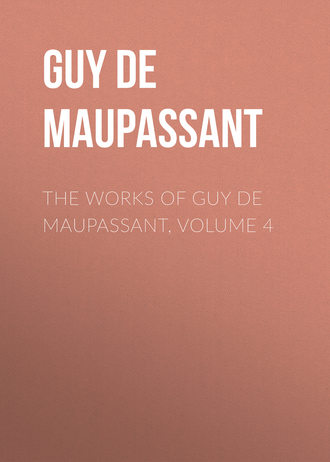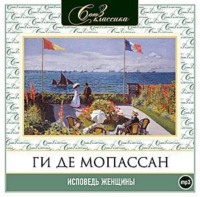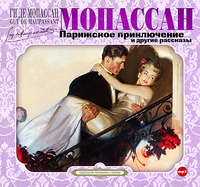 полная версия
полная версияThe Works of Guy de Maupassant, Volume 4
To some, he held out the lure of debauch without any danger attached to it, the desire of finishing their amorous education, of reveling in perverted enjoyment, and to others he held out the irresistible argument that seduced Danae, that of gold.
Others, again, were attracted by his cocked hat and feathers, and by the conceited hope of seeing him at their knees, of throwing their arms round him as if he had been an ordinary lover, although he was a general who rode so imposingly, who was covered with decorations, and to whom all the regiments presented arms simultaneously, the chief whose orders could not be commented on or disputed, and who had such a martial and haughty look.
His pay, allowances and his private income of fifteen thousand francs,2 all went in this way, like water that runs out drop by drop, from a cracked bottle.
He was continually on the alert, and looked out for intrigues with the acuteness of a policeman, followed women about, had all the impudence and all the cleverness of the fast man who has made love for forty years, without ever meaning anything serious, who knows all its lies, tricks and illusions, and who can still do a march without halting on the road, or requiring too much music to put him in proper trim. And in spite of his age and gray hairs, he could have given a sub-lieutenant points, and was very often loved for himself, which is the dream of men who have passed forty, and do not intend to give up the game just yet.
And there were not a dozen in the town who could, without lying, have declared to a jealous husband or a suspicious lover, that they had not, at any rate, once staid late in the little house in the Eglisottes quarter, who could have denied that they had not returned more thoughtful. Not a dozen, certainly, and, perhaps, not six!
Among that dozen or six, however, was Jacques de Montboron's mistress. She was a little marvel, that Madame Courtade, whom the Captain had unearthed in an ecclesiastical warehouse in the Faubourg Saint-Exupère, and not yet twenty. They had begun by smiling at each other, and by exchanging those long looks when they met, which seemed to ask for charity.
Montboron used to pass in front of the shop at the same hours, stopped for a moment with the appearance of a lounger who was loitering about the streets, but immediately her supple figure appeared, pink and fair, shedding the brightness of youth and almost childhood round her, while her looks showed that she was delighted at little gallant incidents which dispelled the monotony and weariness of her life for a time, and gave rise to vague but delightful hopes.
Was love, that love which she had so constantly invoked, really knocking at her door at last, and taking pity on her unhappy isolation? Did that officer, whom she met whenever she went out, as if he had been faithfully watching her, when coming out of church, or when out for a walk in the evening, who said so many delightful things to her with his wheedling eyes, really love her as she wished to be loved, or was he merely amusing himself at that game, because he had nothing better to do in their quiet little town?
But in a short time he wrote to her, and she replied to him, and at last they managed to meet in secret, to make appointments, and talk together.
She knew all the cunning tricks of a simple girl, who has tasted the most delicious of sweets with the tip of her tongue, and acting in concert, and giving each other the word, so that there might be no awkward mistake, they managed to make the husband their unwitting accomplice, without his having the least idea of what was going on.
Courtade was an excellent fellow, who saw no further than the tip of his nose, incapable of rebelling, flabby, fat, steeped in devotion, and thinking too much about heaven to see what a plot was being hatched against him, in our unhappy vale of tears, as the psalters say.
In the good old days of confederacies, he would have made an excellent chief of a corporation; he loved his wife more like a father than a husband, considering that at his age a man ought no longer to think of such trifles, and that, after all, the only real happiness in life was to keep a good table and to have a good digestion, and so he ate like four canons, and drank in proportion.
Only once during his whole life had he shown anything like energy – but he used to relate that occurrence with all the pride of a conqueror, recalling his most heroic battle – and that was on the evening when he refused to allow the bishop to take his cook away, quite regardless of any of the consequences of such a daring deed.
In a few weeks, the Captain became his regular table companion, and his best friend. He had begun by telling him in a boastful manner that, in order to keep a vow that he had made to St. George, during the charge up the slope at Yron, during the battle of Gravelotte, he wished to send two censers and a sanctuary lamp to his village church.
Courtade did his utmost, and all the more readily as this unexpected customer did not appear to pay any regard to money. He sent for several goldsmiths, and showed Montboron models of all kinds; he hesitated, however, and did not seem able to make up his mind, and discussed the subject, designed ornaments himself, gained time, and thus managed to spend several hours every day in the shop.
In fact, he was quite at home in the place, shook hands with Courtade, called him "my dear fellow," and did not wince when he took his arm familiarly before other people, and introduced him to his customers as, "My excellent friend, the Marquis de Montboron." He could go in and out of the house as he pleased, whether the husband was at home or not.
The censers and the lamp were sent in due course to Montboron's château at Pacy-sur-Romanche (in Normandy), and when the package was undone, it caused the greatest surprise to Jacques' mother, who was more accustomed to receiving requests for money from her son, than ecclesiastical objects.
Suddenly, however, without rhyme or reason, little Madame Courtade became insupportable and enigmatical. Her husband could not understand it at all, and grew uneasy, and continually consulted his friend the Captain.
Etiennette's character seemed to have completely changed; she found fifty pretexts for deserting the shop, for coming late, for avoiding tête-à-têtes, in which people come to explanations, and mutually become irritated, though such matters usually end in a reconciliation, amidst a torrent of kisses.
She disappeared for days at a time, and soon, Montboron, who was not fitted to play the part of a Sganarelle, either by age or temperament, became convinced that his mistress was making him wear the horns, that she was hobnobbing with the General, and that she was in possession of one of the five keys of the house in the Eglisottes quarter; and as he was as jealous as an Andalusian, and felt a horror for that kind of pleasantry, he swore that he would make his rival pay a hundred fold for the trick which he had played him.
The Fourteenth of July was approaching, when there was to be a grand parade of the whole garrison on the large review ground, and all along the paling, which divided the spectators from the soldiers, itinerant dealers had put up their stalls, and there were mountebanks' and somnambulists' booths, menageries, and a large circus, which had gone through the town in caravans, with a great noise of trumpets and of drums.
He had given his aide-de-camp his instructions beforehand, for he was more anxious than ever to surprise people, and to have a horse like an equestrian statue, an animal which should outdo that famous black horse of General Boulanger's, about which the Parisian loungers had talked so much, and told Montboron not to mind what the price was, as long as he found him a suitable charger.
When the Captain, a few days before the review, brought him a chestnut jennet, with a long tail and flowing mane, which would not keep quiet for five seconds, but kept on shaking its head, had extraordinary action, answered the slightest touch of the leg, and stepped out as if it knew no other motion, General Daumont de Croisailles showered compliments upon him, and assured him that he knew few officers who possessed his intelligence and his value, and that he should not forget him when the proper time came for recommending him for promotion.
Not a muscle of the Marquis de Montboron's face moved, and when the day of the review arrived, he was at his post on the staff that followed the General, who sat as upright as a dart in the saddle, and looked at the crowd to see whether he could not recognize some old or new female friend there, while his horse pranced and plunged.
He rode onto the review ground, amidst the increasing noise of applause, with a smile upon his lips, when, suddenly, at the moment that he galloped up into the large square, formed by the troops drawn up in a line, the band of the fifty-third regiment struck up a quick march, and, as if obeying a preconcerted signal, the jennet began to turn round, and to accelerate its speed, in spite of the furious tugs at the bridle which the rider gave.
The horse performed beautifully, followed the rhythm of the music, and appeared to be acting under some invisible impulse, and the General had such a comical look on his face, he looked so disconcerted, rolled his eyes, and seemed to be the prey to such terrible exasperation, that he might have been taken for some character in a pantomime, while his staff followed him, without being able to comprehend this fresh fancy of his.
The soldiers presented arms, the music did not stop, though the instrumentalists were much astonished at this interminable ride.
The General at last became out of breath, and could scarcely keep in the saddle, and the women, in the crowded ranks of the spectators, gave prolonged, nervous laughs, which made the old roué's ears tingle with excitement.
The horse did not stop until the music ceased, and then it knelt down with bent head, and put its nostrils into the dust.
It nearly gave General de Croisailles an attack of the jaundice, especially when he found out that it was his aide-de-camp's tit for tat, and that the horse came from a circus which was giving performances in the town. And what irritated him all the more was, that he could not even set it down against Montboron and have him sent to some terrible out-of-the-way hole, for the Captain sent in his resignation, wisely considering that sooner or later he should have to pay the costs of that little trick, and that the chances were that he should not get any further promotion, but remain stationary, like a cab which some bilker has left standing for hours at one end of an arcade, while he has made his escape at the other.
RUST
During nearly his whole life, he had had an insatiable love for sport. He went out every day, from morning till night, with the greatest ardor, in summer and winter, spring and autumn, on the marshes, when it was close time on the plains and in the woods. He shot, he hunted, he coursed, he ferreted; he spoke of nothing but shooting and hunting, he dreamt of it, and continually repeated:
"How miserable any man must be who does not care for sport!"
And now that he was past fifty, he was well, robust, stout and vigorous, though rather bald, and he kept his moustache cut quite short, so that it might not cover his lips, and interfere with his blowing the horn.
He was never called by anything but his first Christian name, Monsieur Hector, but his full name was Baron Hector Gontran de Coutelier, and he lived in a small manor house which he had inherited, in the middle of the woods; and though he knew all the nobility of the department, and met its male representatives out shooting and hunting, he only regularly visited one family, the Courvilles, who were very pleasant neighbors, and had been allied to his race for centuries, and in their house he was liked, and taken the greatest care of, and he used to say: "If I were not a sportsman, I should like to be here always."
Monsieur de Courville had been his friend and comrade from childhood, and lived quietly as a gentleman farmer with his wife, daughter and son-in-law, Monsieur de Darnetot, who did nothing, under the pretext of being devoted to historical studies.
Baron de Coutelier often went and dined with his friends, as much with the object of telling them of the shots he had made, as of anything else. He had long stories about dogs and ferrets, of which he spoke as if they were persons of note, whom he knew very well. He analyzed them, and explained their thoughts and intentions:
"When Medor saw that the corn-crake was leading him such a dance, he said to himself: 'Wait a bit, my friend, we will have a joke.' And then, with a jerk of the head to me, to make me go into the corner of the clover field, he began to quarter the sloping ground, noisily brushing through the clover to drive the bird into a corner from which it could not escape.
"Everything happened as he had foreseen. Suddenly, the corn-crake found itself on the borders of the clover, and it could not go any further without showing itself; Medor stood and pointed, half-looking round at me, but at a sign from me, he drew up to it, flushed the corn-crake; bang! down it came, and Medor, as he brought it to me, wagged his tail, as much as to say: 'How about that, Monsieur Hector?'"
Courville, Darnetot, and the two ladies laughed very heartily at those picturesque descriptions into which the Baron threw his whole heart. He grew animated, moved his arms about, and gesticulated with his whole body; and when he described the death of anything he had killed, he gave a formidable laugh, and said:
"Was not that a good shot?"
As soon as they began to speak about anything else, he left off listening, and hummed a hunting song, or a few notes to imitate a hunting horn, to himself.
He had only lived for field sports, and was growing old, without thinking about it, or guessing it, when he had a severe attack of rheumatism, and was confined to his bed for two months, and nearly died of grief and weariness.
As he kept no female servant, for an old footman did all the cooking, he could not get any hot poultices, nor could he have any of those little attentions, nor anything that an invalid requires. His gamekeeper was his sick nurse, and as the servant found the time hang just as heavily on his hands as it did on his master's, he slept nearly all day and all night in any easy chair, while the Baron was swearing and flying into a rage between the sheets.
The ladies of the De Courville family came to see him occasionally, and those were hours of calm and comfort for him. They prepared his herb tea, attended to the fire, served him his breakfast up daintily, by the side of his bed, and when they were going again, he used to say:
"By Jove! You ought to come here altogether," which made them laugh heartily.
When he was getting better, and was beginning to go out shooting again, he went to dine with his friends one evening; but he was not at all in his usual spirits. He was tormented by one continual fear – that he might have another attack before shooting began, and when he was taking his leave at night, when the women were wrapping him up in a shawl, and tying a silk handkerchief round his neck, which he allowed to be done for the first time in his life, he said in a disconsolated voice:
"If it goes on like this, I shall be done for."
As soon as he had gone, Madame Darnetot said to her mother:
"We ought to try and get the Baron married."
They all raised their hands at the proposal. How was it that they had never thought of it before? And during all the rest of the evening they discussed the widows whom they knew, and their choice fell on a woman of forty, who was still pretty, fairly rich, very good-tempered and in excellent health, whose name was Madame Berthe Vilers, and, accordingly, she was invited to spend a month at the château. She was very dull at home, and was very glad to come; she was lively and active, and Monsieur de Coutelier took her fancy immediately. She amused herself with him as if he had been a living toy, and spent hours in asking him slyly about the sentiments of rabbits and the machinations of foxes, and he gravely distinguished between the various ways of looking at things which different animals had, and ascribed plans and subtle arguments to them, just as he did to men of his acquaintance.
The attention she paid him, delighted him, and one evening, to show his esteem for her, he asked her to go out shooting with him, which he had never done to any woman before, and the invitation appeared so funny to her that she accepted it.
It was quite an amusement for them to fit her out; everybody offered her something, and she came out in a sort of short riding habit, with boots and men's breeches, a short petticoat, a velvet jacket, which was too tight for her across the chest, and a huntsman's black velvet cap.
The Baron seemed as excited as if he were going to fire his first shot. He minutely explained to her the direction of the wind, and how different dogs worked. Then he took her into a field, and followed her as anxiously as a nurse does when her charge is trying to walk for the first time.
Medor soon made a point, and stopped with his tail out stiff and one paw up, and the Baron, standing behind his pupil, was trembling like a leaf, and whispered:
"Look out, they are par … par … partridges." And almost before he had finished, there was a loud whirr—whirr, and a covey of large birds flew up in the air, with a tremendous noise.
Madame Vilers was startled, shut her eyes, fired off both barrels and staggered at the recoil of the gun; but when she had recovered her self-possession, she saw that the Baron was dancing about like a madman, and that Medor was bringing back the first of the two partridges which she had killed.
From that day, Monsieur de Coutelier was in love with her, and used to say, raising his eyes: "What a woman!" And he used to go and see them every evening now, and talked about shooting.
One day, Monsieur de Courville, who was walking part of the way with him, asked him, suddenly:
"Why don't you marry her?"
The Baron was altogether taken by surprise, and said:
"What? I? Marry her? … Well … really…"
And he said no more for a while, but then, suddenly shaking hands with his companion, he said:
"Good-bye, my friend," and quickly disappeared in the darkness.
He did not go again for three days, but when he reappeared, he was pale from thinking the matter over, and graver than usual. Taking Monsieur de Courville aside, he said:
"That was a capital idea of yours; try and persuade her to accept me, for one might say that a woman like she is, was made for me, and you and I shall be able to have some sort of sport together, all the year round."
As Monsieur de Courville felt certain that his friend would not meet with a refusal, he replied:
"Propose to her immediately, my dear fellow, or would you rather that I did it for you?"
But the Baron grew suddenly nervous, and said, with some hesitation:
"No, … no… I must go to Paris for … for a few days. As soon as I come back, I will give you a definite answer." No other explanation was forthcoming, and he started the next morning.
He made a long stay. One, two, three weeks passed, but Monsieur de Coutelier did not return, and the Courvilles, who were surprised and uneasy, did not know what to say to their friend, whom they had informed of the Baron's wishes. Every other day they sent to his house for news of him, but none of his servants had a line.
But one evening, while Madame Vilers was singing, and accompanying herself on the piano, a servant came with a mysterious air, and told Monsieur de Courville that a gentleman wanted to see him. It was the Baron, in a traveling suit, who looked much altered and older, and as soon as he saw his old friend, he seized both his hands, and said, in a somewhat tired voice: "I have just returned, my dear friend, and I have come to you immediately; I am thoroughly knocked up."
Then he hesitated in visible embarrassment, and presently said:
"I wished to tell you … immediately … that … that business … you know what I mean … must come to nothing."
Monsieur de Courville looked at him in stupefaction. "Must come to nothing?.. Why?"
"Oh! Do not ask me, please; it would be too painful for me to tell you; but you may rest assured that I am acting like an honorable man. I cannot … I have no right … no right, you understand, to marry this lady, and I will wait until she has gone, to come here again; it would be too painful for me to see her. Good-bye." And he absolutely ran away.
The whole family deliberated and discussed the matter, surmising a thousand things. The conclusion they came to was, that the Baron's past life concealed some great mystery, that, perhaps, he had natural children, or some connection of long standing. At any rate, the matter seemed serious, and so as to avoid any difficult complications, they adroitly informed Madame Vilers of the state of affairs, who returned home just as much of a widow as she had come.
Three months more passed, when one evening, when he had dined rather too well, and was rather unsteady on his legs, Monsieur de Coutelier, while he was smoking his pipe with Monsieur de Courville, said to him:
"You would really pity me, if you only knew how continually I am thinking about your friend."
But the other, who had been rather vexed at the Baron's behavior in the circumstances, told him exactly what he thought of him:
"By Jove, my good friend, when a man has any secrets in his existence, like you have, he does not make advances to a woman, immediately, as you did, for you must surely have foreseen the reason why you had to draw back."
The Baron left off smoking in some confusion.
"Yes, and no; at any rate, I could not have believed what actually happened."
Whereupon, Monsieur de Courville lost his patience, and replied:
"One ought to foresee everything."
But Monsieur de Coutelier replied in a low voice, in case anybody should be listening: "I see that I have hurt your feelings, and will tell you everything, so that you may forgive me. You know that for twenty years I have lived only for sport; I care for nothing else, and think about nothing else. Consequently, when I was on the point of undertaking certain obligations with regard to this lady, I felt some scruples of conscience. Since I have given up the habit of … of love, there! I have not known whether I was still capable of … you know what I mean … Just think! It is exactly sixteen years since … I for the last time … you understand what I mean. In this neighborhood, it is not easy to … you know. And then, I had other things to do. I prefer to use my gun, and so before entering into an engagement before the Mayor3 and the Priest to … well, I was frightened. I said to myself: 'Confound it; suppose I missed fire!' An honorable man always keeps his engagements, and in this case, I was undertaking sacred duties with regard to this lady, and so, to feel sure, I made up my mind to go and spend a week in Paris.
"At the end of that time, nothing, absolutely nothing occurred. I always lost the game… I waited for a fortnight, three weeks, continually hoping. In the restaurants, I ate a number of highly seasoned dishes, which upset my stomach, and … and it was still the same thing … or rather, nothing. You will, therefore, understand, that, in such circumstances, and having assured myself of the fact, the only thing I could do was … was … to withdraw; and I did so."
Monsieur de Courville had to struggle very hard not to laugh, and he shook hands with the Baron, saying:
"I am very sorry for you," and accompanied him half-way home.
When he got back, and was alone with his wife, he told her everything, nearly choking with laughter; she, however, did not laugh, but listened very attentively, and when her husband had finished, she said, very seriously:
"The Baron is a fool, my dear; he was frightened, that is all. I will write and ask Berthe to come back here as soon as possible."
And when Monsieur de Courville observed that their friend had made such long and useless attempts, she merely said:
"Nonsense! When a man loves his wife, you know … that sort of thing adjusts itself to the situation."








